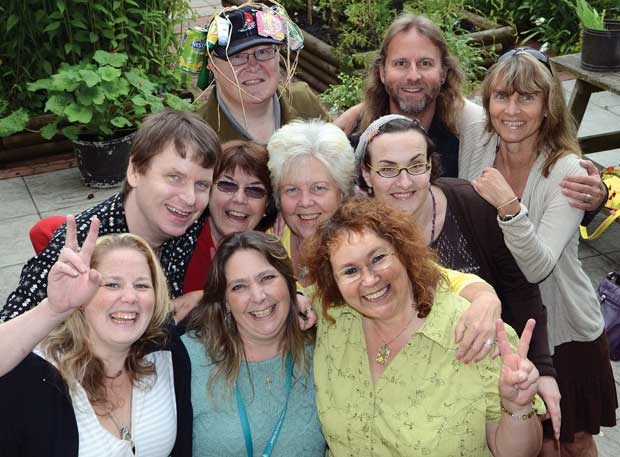THE success of a program seeing those in recovery from mental illness offer support to those currently struggling was celebrated on the North Shore Wednesday.
The Sea To Sky Peer Support Program, offered through North Shore Adult Community Mental Health, part of Vancouver Coastal Health, was launched as a pilot in 2006.
"The program trains people who have lived experience with mental illness to provide support to others," says Gill Walker, occupational therapist, North Shore Adult Community Mental Health.
Based on its success, the program has continued and now has 10 peer support workers working one-on-one with mental health patients.
North Shore Adult Community Mental Health hosts an annual garden party for staff, clients and community partners and this year's event, held at its location at 1350 St. Andrews Ave. in North Vancouver, was intended to recognize those offering peer support and the positive impacts of the program as a whole.
"We're seeing changes both for our clients and for our staff, because the peer support workers not only act as role models for clients but they also act as role models for staff," says Walker. "They embody recovery from mental illness, which
is a stigmatized condition that's often portrayed quite negatively and chronically in terms of the condition persisting and a lot of negative effects of the symptoms. Peer support shows that it is possible to live well with mental illness."
Peer support workers, parttime contract workers, provide a variety of support to clients, either out in the community or in a hospital setting, under the supervision of an occupational therapist.
"Some tasks that they may do would be assisting someone with computer skills, going on walks, going to the gym, or doing an aquacise class with their client," says Walker.
Time spent with each client varies depending on their goal. Intake is open to clients of North Shore Adult Community Mental Health as it's one of the rehab services the organization provides.
North Vancouver resident Sean Stewart, 34, has just completed his peer support worker training and practicum, and was among those in attendance at the garden party Wednesday.
Stewart's mental illness became apparent in the wake of 9/11. Overwhelmed by the international act of terrorism, he began acting erratically and doctors eventually diagnosed him with schizoaffective disorder. He's undergone hospitalization and various treatments as well as taken advantage of local resources, including the Sea to Sky Peer Support Program. He was accompanied to the gym by a peer support worker.
"It was getting out and getting healthy and talking to someone about it and he was interested," he says.
Stewart found the program helpful and was inspired to become a peer support worker himself. "Nobody knows it like someone who's gone through it," he says, adding his own journey with mental illness means he has real empathy for his clients and allows him to offer insight.
"I still see glass underneath me sometimes, it's scary," says Stewart. "I fell through. . . . I used to feel like I was invincible. I no longer feel that way, both physically and mentally."
In addition to his work with North Shore Adult Community Mental Health, Stewart is a strong advocate for people with disabilities. A student at Capilano University, he serves as the Capilano Students' Union disabilities liaison. He speaks to students and has currently organized a petition to raise shelter and support allowances for people with disabilities in B.C. (www.csu.bc.ca).
"I feel the intrinsic value of helping other people with different disabilities is more valuable than anything I can imagine really," he says. "I love people in general, I care about people and I like to help and it's what I'm going to continue to work towards academically and socially, and mentoring through peer support and my disabilities liaison position."
Staff of North Shore Adult Community Mental Health are currently seeking applications for peer support trainees. Trainees undergo classroom training from March to June 2012 (six-nine hours a week) and complete a practicum (40 hours). After graduation they are eligible to apply for paid peer support positions. Eligible applicants can live anywhere in the Lower Mainland though they must have lived experience of mental illness. The application deadline is Sept. 16. For more information, email debbie. [email protected].



